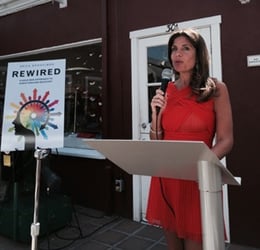
Leading addiction expert Erica Spiegelman discusses her revolutionary new book, "REWIRED: A Bold New Approach to Addiction and Recovery." Rewired is a new, breakthrough approach to fighting addiction and self-damaging behavior by acknowledging our personal power to bring ourselves back from the brink.
In this interview, we're going to be talking with Erica about her book Rewired: A Bold New Approach to Addiction and Recovery. Our focus is on healing core issues since that's what we do at The Clearing.
You can view the video interview or read the interview transcript below.
Transcript of Our Discussion with Erica Spiegelman, Author of Rewired
Caroline: Erica, thank you for joining us today.
Erica: Thank you for having me, that's so great. It's so nice to be aligned with people that are on the same kind of path and doing the same things and inspiring and helping others. It's so cool.
Caroline: Definitely, I wholeheartedly agree. Just to get started, to help our listeners to get to know you, could you tell us a bit about your recovery journey, about your alcoholism and how that all started for you?
Erica: Sure. About 13 years old was the first time I tried alcohol -- just like most teenagers kind of experimenting here and there with pot or alcohol -- but it didn't really become problematic until college. And I was in college and began drinking every day.
And I always knew, my inner voice was pretty much at ease when I was drinking. I knew that was a problem, I felt like it was a self betrayal. I couldn't relax without it.
At 20 years old that's kind of jarring to know that if you can't relax, you can't meet people, you can't enjoy yourself without it, and so I knew deep down like, "Uh-oh, this is going to be a problem and I'm someday going to have to confront this and it's going to have to end."
But yet at that time you put on that mask of denial and you kind of move through, and that's what I did until my mid 20's.
My family noticed my personality was changing and I was isolating and I wasn't as close to them as I usually was.
 I was living in New York after college and as you know, the city never sleeps and you're always going out and it's a very social environment. My drinking became out of control and that's when my family noticed my personality was changing and I was isolating and I wasn't as close to them as I usually was, because we have a very tight knit family and I basically asked for help eventually.
I was living in New York after college and as you know, the city never sleeps and you're always going out and it's a very social environment. My drinking became out of control and that's when my family noticed my personality was changing and I was isolating and I wasn't as close to them as I usually was, because we have a very tight knit family and I basically asked for help eventually.
It's been nine years, it'll be going on my tenth year, and it's an amazing journey and really just being able to help people see that you could create any life you want once you get rid of the things that are distracting you from living your best life.
Caroline: Thank you for sharing that. I very much enjoyed reading your book, Rewired, which we've got right here.
I really appreciated how this book doesn't really focus that much on the substance use itself. It really goes into the deeper issues, which are the trauma, the boundary confusion, and the dishonesty.
Honesty is the #1 Requirement For a Sober Life
At the beginning of the book, you write that, “Honesty is the number one requirement for a sober life.” Can you say more about why that is true?
Erica: Yeah, one lie leads to a web of lies, and even if it's a white lie or a small lie, and why I believe even white lies are detrimental to our mental and emotional health is because once we give ourselves an excuse to kind of bend the truth or lie or hide or omit something, then we're not speaking our truths, we're not saying what we truly feel, we're not asking for what we really want.
That's when it becomes a slippery slope … if you were to lay the pavement for building, if you were to lay the pavement for a new, healthy home for yourself, it has to be honesty, honesty with yourself and others.
Even white lies are detrimental to our mental and emotional health.
That means not ignoring what you're looking for in life.
I think [for] a lot us, dishonesty is saying what you want to hear.
So Caroline, I’m looking at you and I'm like, "What does she want me to act like and be like and how does she want me to be in terms of our relationship?" And so, I may not tell the truth or bend the truth, so dishonesty's not just a bold lie, it's so much more than just that, and that's what I really get into in that chapter.
Caroline: That's a really great point, it's twisting yourself in knots trying to be someone that you think other people want you to be.
Erica: Yeah, that's being dishonest with yourself and others.
Caroline: Can you share a practical tip?
If people are thinking, "Yeah, I see myself in that, I see myself contorting to try and be the person I think other people want me to be."
What's a place they can start? How can they begin to get honest?
Erica: I think it's a little uncomfortable sometimes for people, but you have to lean into your truth and you have to test it out. There's no other way but through.
You have to take action.
 That's the thing is that it may be uncomfortable, but you have to pick someone you're safe with, like a friend, and not a total stranger, not someone you just started dating, someone you really truly feel safe with, and maybe you're contorting with them a little bit, or maybe you just have never stepped into a need or a desire or a story that you know to be who you are, or to represent yourself, and say it to that person.
That's the thing is that it may be uncomfortable, but you have to pick someone you're safe with, like a friend, and not a total stranger, not someone you just started dating, someone you really truly feel safe with, and maybe you're contorting with them a little bit, or maybe you just have never stepped into a need or a desire or a story that you know to be who you are, or to represent yourself, and say it to that person.
It's about practice, and the more that we can do it, and you start with someone safe, the more it will become easier and more natural with new people that come into your life, whether that's a co-worker, a new relationship or whoever.
Caroline: That's such a great point, to start with someone that you're already very comfortable with.
Often I know for me there's the temptation to, "Oh, I need to make this change, let me start with the most challenging person, the one I'm really scared of." That usually doesn't go well.
Erica: Right. It's easier when it's somebody that you know to a degree at least and that you could trust, that's not going to abandon you or criticize you. You don't want to speak a truth and then have this experience of a negative reaction and that may deter you from doing that again.
Caroline: Right, setting yourself up to fail in that way.
Erica: Right, yeah.
The Importance of Boundaries in Addiction Recovery
Caroline: Another major theme of Rewired that ties in really well is the theme of boundaries.
You talk about how a lot of people are really unsure about what is and isn't theirs to carry. You even go so far as to say that, “Addiction is largely a disease of poor boundaries.” I love that.
Can you talk about that link between boundaries and addiction?
Erica: Oh my gosh, yeah, it's everything.
We lose our boundaries with addiction, we drink more than we should, or we use more than we should. We say things and act in ways which we have no desire to do, but yet we do that.
There's no boundaries with our behaviors, so there's a direct correlation. I also believe a lot of us are pleasers in life, and especially when in your active addiction, you want to keep people at bay.
You don't really want people to be in your business, so you have poor boundaries or you let people come into your life that will put up with your drinking, but yet they exploit you or they really don't want to be with you for you, they want to be with you because they're your drinking buddy or your using friend or whatever.
Then that becomes even worse in terms of boundaries because then you feel taken advantage of, you can't trust people, so let's fast forward to now getting sober and getting healthy, whatever you want to call it, a road to recovery.
So many people don't necessarily always want to call it sobriety, so let's call it getting healthy, and you're starting to respect yourself, your time, your energy and with that being said, you have to say no sometimes.
You can't always say yes to everyone that asks you for every favor. Sometimes you've had people in your family that have guilted you or shamed you for your past behavior, and that has to stop, so speaking the boundary's important.
We follow through with [boundaries] so that people understand that we are moving forward and if they want to sit in the past, they'll be sitting there by themselves.
Saying, "When you guilt me, I'm going to hang up the phone," or, "I've asked you not to bring that up again, that was two years ago and yet you keep doing that, I'm going to have to walk away from you at this point."
These are boundaries that we can follow through with so that people understand that we are moving forward and if they want to sit in the past, they'll be sitting there by themselves.
Caroline: Wow, that's a great way of putting it.
I also really liked your definition of someone who struggles with substance abuse as, "A person who is driven to support and help others, often at great peril to his or her own safety, well-being, and health."
 It reminded me of a friend of mine who, she was really trying to stop using and something I heard from her frequently was, "But I'm the one who helps all my friends get their drugs."
It reminded me of a friend of mine who, she was really trying to stop using and something I heard from her frequently was, "But I'm the one who helps all my friends get their drugs."
I'm thinking, "Really, that's really what you're concerned about right now?"
But she was that type of person, she really legitimately was concerned for them and wanted to help them even though it was at a detriment to her own well-being.
Could you maybe share a little bit about how, if people recognize themselves in there, how can they start speaking up and what are some tips for them?
Erica: Saying no is really good.
If someone asks you even ... I have clients, I work at an addiction treatment center and these clients of mine, a younger demographic ... we have people from 18 to 27 and they're smoking cigarettes.
I have a client that came in the other day and said, "This girl keeps asking me for cigarettes over and over and over again and I don't have money to buy more and I don't want to give them to her anymore and I can't say no."
[Try] saying, "I'm really working on setting boundaries right now, and just for my own well-being and my own health, I have to say no."
I said, "Okay, let's try this. Let's try saying, 'It's nothing against you, it's nothing personal, but I have to have these boundaries.'"
Just saying that you need boundaries to somebody instead of ... Because people take things personal and then we're afraid of rejecting someone or abandoning someone or being abandoned, so saying, "I'm really working on setting boundaries right now, and just for my own well-being and my own health, I have to say no."
Believe it or not, that's sometimes easier to actually say things at face value instead of like, "Um, you know, I can't really give you a ride right now because ..."
Make up an excuse or a lie because that gets you into a whole other mess. Just saying, "I'm working on being healthy and having some better boundaries for myself," is really a way to do it.
Caroline: Oh, I find that so personally helpful because often I feel like I need to explain five reasons why I can't do it, and it's like, maybe it's just that this is what I need and this is what I'm working on and putting it in that personal growth framework of just, this is something I'm working on.
Erica: Yes.
Even when I changed my life, my mom - who I love very much and we're super close - had no boundaries. She just never has had boundaries.
I say, "Oh, I'm taking a shower," and she's in the bathroom before I close the door. She's just like, "I have to tell you one more thing," and I'm like, "I need 30 minutes of privacy or 15 to myself." I went through a period of learning meditation and she would be screaming at me to come in for dinner as I just said to her, "I need 20 minutes to go meditate." These are conversations I had to say and I would say to her, "You know, I told you I need this."
 At some point I just said, "You know what, I'm going to tell her I'm trying to practice boundaries," and I did. I said, "Mom, this is part of my health plan right now is to have boundaries with you and other people. Nothing against you or anyone else, it's just for my own growth," and she finally understood when I explained it that way.
At some point I just said, "You know what, I'm going to tell her I'm trying to practice boundaries," and I did. I said, "Mom, this is part of my health plan right now is to have boundaries with you and other people. Nothing against you or anyone else, it's just for my own growth," and she finally understood when I explained it that way.
Caroline: Yeah, it really seems like it would ratchet down the defensiveness too, like you said, it's not personal to you, it's just global, this is what I'm doing with everybody.
Erica: For myself. It's back to that "I" statement, it's like saying, "I feel a certain way," it's like, "No, this is what I'm working on." If someone says no, then you really have a huge answer in front of you that they just don't respect you.
Caroline: Right, I can't imagine someone saying, "I really have needed more sleep or more whatever," and me being like, "Well too bad, I need you to do this.”
Erica: Right, right, yeah.
Caroline: And like you said, if someone does, that gives you a lot of good information.
Erica: You get answers either way, yeah.
Addiction is Like Being Frozen in Time
Caroline: I like that. Another great idea from Rewired that I really liked was the concept that, "Addiction is like being frozen in time” ... connecting to what we're talking about, personal growth.
You write about how we have a trauma - which in psychology, we’re talking about anything that's shocking to the individual, not necessarily a medical trauma - and if you don't heal that trauma, a part of you gets stuck there and you have this image of ... walking around like Eeyore from Winnie the Pooh with that cloud over his head like you're stuck in that moment.
Clearing founder Joe Koelzer likes to say that we've all seen somebody acting badly and thought, "That guy's really acting like an eight year old."
That statement has a lot of truth to it because ... developmentally, a part of him is stuck at eight or 14 or whatever age that trauma occurred.
How does that idea inform your work with clients and how do you start to grow up?
Erica: Yes, well, for me, it’s introducing what change and evolution is.
A whole chapter of my book is evolution. What you were saying about trauma, just to add one more thing to that, is trauma is something, a shock to the nervous system, so it's when our nervous system is dysregulated, so like you said, it doesn't have to be a major accident or trauma or abuse or something.
There are many little traumas that have happened within our lives. We get made fun of, we get bullied, we disappoint or do something to hurt someone else and that can be traumatic for us.
We get made fun of, we get bullied, we disappoint or do something to hurt someone else and that can be traumatic for us.
Like you said that ... hangs around and it doesn't ever leave, so a couple things: Letting go, learning that change is positive and reframing what that is to grow up and I guess take action in your life towards experiencing what it's like to be vulnerable or lean into a boundary.
 Those are the things that help us grow in terms of our emotional capabilities.
Those are the things that help us grow in terms of our emotional capabilities.
Our emotional intelligence does sometimes stop when we introduce substances to our system at 13 years old, if that's when you started drinking and you had your first girlfriend or boyfriend at 13, you experience love and a crush and do that with alcohol, or you have all your friendships around pot and alcohol, then that's how you view relating to others.
Interpersonal relationships maybe get mixed up with that, then you fast forward and you have college and all of college is mixed up with that, so it's like, yeah, we don't grow emotionally.
That's where, when I was speaking about that analogy with Eeyore, it's more the emotional growth that gets stunted.
So to push yourself, so the suggestions are to push yourself and be vulnerable, say something, speak your truth.
Try to have relationships where it's based on just honesty and health and not external nonsense, chitter-chatter. Get a little deeper.
Caroline: Yeah, feel your actual feelings and engage on that emotional level, because it's easy to talk yourself into, "Oh, I'm totally over that," but it's like, "On the emotional level, are you really working with it?" Yeah, that's a really good point.
Also, along the same lines, you talk about the importance of self compassion and being able to nurture yourself.
What are some concrete practices if people are like, "Okay, I want to heal on the emotional level, but I know I'm really mean to myself, how can I start to work on that?"
Erica: You have to start speaking to yourself kindly and pushing yourself.
When I started getting healthy, I started running and I would see the block ahead of me and I'd be like, "You got this, you're strong, you can do this."
It's about creating positive talk with yourself, in your own head.
It's about creating positive talk with yourself, in your own head. From the minute we wake up to the minute we go to bed at night we're talking to ourselves, right, so you might as well start the habit of being kind and compassionate to yourself.
It sounds silly, but it is the only thing that probably kept me going for that first couple months is ... Even if you're not believing it, still say it.
If you're researching addiction recovery programs, check out our free eBook, Healing Underlying Core Issues.
Free eBook Download:
Healing Underlying Core Issues
The Importance of Affirmations in Addiction Recovery
 That's why I have a whole chapter also on affirmations.
That's why I have a whole chapter also on affirmations.
I really believe strongly in affirmations. I don't care if you don't have a lot of self-love at this point.
I understand that may be hard for people that are early in addiction recovery, but you made it today, you made it today, so you can say, "I am proud of myself today that I am still sober. I'm proud of myself today that I went to work, I did my laundry, I took a shower, I took a bath, I cooked a meal, I ate three meals today, I called my mother." Whatever, pick one thing.
It's almost like gratitude. We have to find things every day to be grateful for and we have to find things where we can say to ourselves, "I'm proud of you."
To yourself. You have to find at least one or two things a day. If it's a big thing, like, "I'm proud of you that you wrote the book. I'm proud of you that you did this."
Big things, or it could be little things, I say, literally to myself, "I'm so proud that I did laundry today," or "I'm so proud ..."
Then I'm inclined to say, "But I should do that, why should I be proud of myself for the things that I should be doing?" You weren't doing them when you were not living in your best way. That I know, so now that you are, dive in, go a little deeper and just conjure up that pride.
Caroline: I like that, particularly because I need to do some laundry, so that's affirming!
Erica: I just did some, yeah.
Caroline: It's disproportionately hard sometimes - especially if you're in recovery, you're dealing with emotional issues - just doing those basic life tasks, it does take lot of energy and it is worth affirming yourself for, like, "Hey, it was hard, but you did it, you get credit."
Erica: Exactly.
Caroline: Well, thank you for mentioning intentions and affirmations because I definitely appreciate, at the end of Rewired, there's a whole bunch of lists for the different sections and affirmations that people can use, so I just wanted to mention those there for folks.
Erica: Yeah, so if you can't think of any, I provide you with them for sure. That was the point.
Caroline: Exactly. That's something also that, I went through the program at The Clearing and it was really funny because, like you said, at first you're sort of skeptical and thinking, "Well, I want to believe these things, but I don't actually," but if you're saying them and they're getting into your consciousness, finally you actually start to be like, "Wait a minute, I think I sort of do believe this about myself."
Erica: Yes, exactly, yeah, well, good for you, congratulations.
Caroline: Thank you. One morning I woke up kind of grumpy and I was walking over to brush my teeth and I was just like, "This day is already really hard, blah blah blah," and I heard the voice of our session leader kind of popped into my head and it was like, "But what's your intention?" I was like, "Oh my God, they're in my head."
Erica: Yeah, exactly, it gets in your head. That's great.
For years we thought we were hardwired—[that] we can't change. That's not true.
Can Your Brain Be Rewired From Addiction?
Caroline: Speaking of being in your head, the whole premise of your book is talking about the idea that we can rewire our minds and that neuroplasticity, the ability to shape the brain, is a real thing.
It's scientifically proven, we can change the structure of our minds by what we think.
Can you talk a bit about how compassion and also changing these thought patterns, using intentions, how does that change the brain and help people heal?
Erica: Like what you said, the brain is very soft-wired.
For years we thought we were hardwired, we can't change. That's not true.
I like to compare it to a pathway. It's the easiest for most people to understand. It's like when we were living ... This is a great analogy that I also like and I'll just share it.
 When we were living in our old ways - using and being unhealthy and living with fear and dishonesty and all those other emotions that fall under the fear category - that was our old home in the forest and we went there every single day and that's how we knew how to get there, we saw our footsteps clearly and then one day we decide to change our lives and we want to build a new house in the same forest, so we do.
When we were living in our old ways - using and being unhealthy and living with fear and dishonesty and all those other emotions that fall under the fear category - that was our old home in the forest and we went there every single day and that's how we knew how to get there, we saw our footsteps clearly and then one day we decide to change our lives and we want to build a new house in the same forest, so we do.
We get help, we build a new house and we start walking there one day, two days, three days, a month, two months, three months, and then before we know it, the fourth month all of the sudden, or the third month, at some point you start to see your footprints on that path to your new house.
Every day now you're walking more and more and before you know it, it's this huge path, beautiful path that has been carved up by your footprints and you have a new home and you know how to get there.
Then for one moment, you have a hard day and you're like, "Gosh, where's that old house I used to live in?"
You look back in that same forest and the old path is totally grown over, all the plants and trees, and you cannot find it.
You cannot find that old house and you no longer really, you could recall it, but you don't know how to get back there.
So with repetition, repetition, repetition, repetition, with positive things, you will create new paths in your brain.
That's kind of the way I view changing your brain and habits, and so repetition, repetition, repetition, repetition, with positive things, you will create new paths.
Caroline: I love that, that's a great visual. I could see it as you were describing it.
Erica: Yeah.
Caroline: It's true, it becomes harder to go back into those same ruts if you're making new pathways.
Erica: Yeah, you know it's there, you know you remember it, but you don't necessarily run back to it that quick anymore. And that's the beauty of time and routine and healthy habits.
How Time Management Works Into Addiction Recovery
Caroline: Exactly.
Speaking of time, my favorite chapter was actually the one about time management because I'm just a sucker for that. I love talking about time management. You dive into the practical how to of putting your own needs first, and so can you talk about how that's changed for you since you began your recovery, and how you work with clients on their time management?
Erica: Well, putting your needs first, for 9 years I've had kind of a non-negotiable with mind, body, spirit, things I need to feel good mentally, emotionally, spiritually, so those don't get put on the back burner.
They do once in a while, traveling and you have family and you have things that come up in life, but they don't leave for too long, like maybe I won't work out for three days but at the third day, I am getting back to that.
 I've learned to be more lenient with myself.
I've learned to be more lenient with myself.
When I first got sober, I was adamant about every single day, working out.
Not a crazy amount of time, but I had to move, I had to meditate or I had to eat healthy every day.
Now 9 years later, I could bend a little bit, I don't have to go to bed at a certain time, but it really was helpful for me, my time, that I was on a schedule when I first changed my life.
In bed at 10:30 and I loved it. I loved getting up and cooking a big breakfast and going for a run.
I even would tell my job, my boss at the time, "I have to leave by six," I have boundaries and that helps with time management because he, for a while in the beginning, was calling me at 8:00 and I was like, "I'm cooking dinner with my loved ones."
It's important to me now.
I can't sacrifice these things and I can't get to work at 6:00am because I have to go to a spin class and I'm working out in the mornings, and so I began to value and respect my own time more, having those boundaries and having those routines in place.
In Rewired, I also talk about doing a pie chart, kind of seeing where ... You don't say to somebody, "Oh, okay, I'm not going to brush my teeth today because I have to go ..."
No, you do those things and that's the same thing for everything.
Everything has to be priority, you don't just not take a shower, let's say, or whatever it is that is a non-negotiable for you, all these things have to be just as important.
Caroline: Yeah, it's so interesting how when you reframe something as ... It could be exercise for some people, like for you, I hear it, it's a non-negotiable, it's something that has to be part of your life.
Once people can make that shift of thinking about it that way, it's like brushing your teeth, it's like washing your face, it's just something you do. That really helps.
Erica: Exactly. It does, it really does. That way, you don't give yourself an excuse or an out.
Caroline: Exactly, exactly, yeah. I had an experience over Thanksgiving where I was with my parents, with my family and my mom was asking if I wanted to do something, I think it was about watching a TV show. I was like, "Well, I am really tired, but ..." and I was kind of waffling and she did a really good job of basically being like, "No, I hear that you're tired, so honor your need to go to bed.”
And I was really glad that she had done that because for a minute, yeah, I was kind of like, "Well, do I really need sleep?" It's like, "No, I know myself better than that." Sleep really is super duper important, obviously she knows me really well too, so she's like, "No, we'll all be happier if you sleep, you should do that."
Erica: Yep, exactly, exactly, yeah, sleep's something huge for time management, and getting even a calendar, practical tips, as you mentioned before, getting a calendar.
I have my blue book right here. It has my dates and my appointments. Even though I have a phone and even though I use a calendar in the phone, I still use this as a backup.
For whatever reason I'm more of a visual learner, I like to see things written down. Even if I see it on my phone it just does not resonate the same way it does with that, so those are three dollars CVS or Walgreens or whatever, it's easy to get.
Caroline: Totally. I feel that way too. If I physically write it down, it's a different kind of commitment.
Erica: Yeah.
Final Thoughts on Rewired: A Bold New Approach to Addiction and Recovery
Caroline: Well, just as we draw to the end of our time, is there anything else that you want to share? Words of wisdom or encouragement, or anything else that we didn't cover that you want to dive into?
Erica: I appreciate so much spending time with you today and just the last thing is just the hope.
It's something for me that I always want to end with because I know how discouraging and sometimes hard and uncomfortable this journey is for people, but take it from us and the people that have walked this path before that, have faith and hope that there is such a brighter future for everybody that's listening.
...allow yourself the gift of love and healing. And I promise you, you'll have the best life that you could ever have imagined.
 We really can live our best lives and thrive in such ways that you don't even know that's possible, so just allowing yourself to clear out negative energy, negative habits, negative routines, negative talk and really just allow yourself the gift of love and healing.
We really can live our best lives and thrive in such ways that you don't even know that's possible, so just allowing yourself to clear out negative energy, negative habits, negative routines, negative talk and really just allow yourself the gift of love and healing.
And I promise you, you'll have the best life that you could ever have imagined.
Caroline: Awesome. Thank you so much, it's been good to talk to you today.
Erica: Thank you so much.
Get the new book, "REWIRED: A Bold New Approach to Addiction and Recovery."
Rewired is a new, breakthrough approach to fighting addiction and self-damaging behavior by acknowledging our personal power to bring ourselves back from the brink.
Get the Book Rewired: A Bold New Approach to Addiction and Recovery
Erica is an addiction and wellness specialist as well as a motivational speaker and author. She works with individuals on personal growth and treating the whole person, providing tools on how to reach emotional, mental, and physical freedom. Erica's focus is on rewiring the brain to live more authentically and to end substance abuse. To learn more, visit EricaSpiegelman.com.



